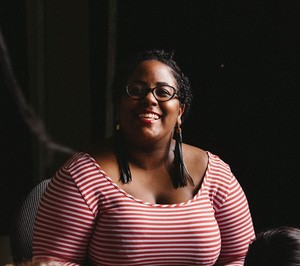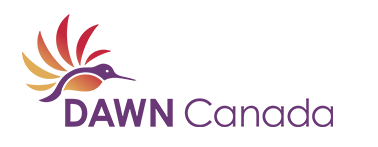On Blackness, Gender and Disability
In recognition of Black History Month, DAWN Canada has asked Black women with disabilities to share their reflections and analysis of how race, gender and disability intersect. In this blog, Karine-Myrgianie Jean-François discusses Blackness, gender and disability.
- How does race/Black identity intersect with gender and disability to create particular challenges for Black women with disabilities? How does this affect the lived experiences of Black women with disabilities?
Karine: Blackness, gender and disability intertwine in many ways. We know that Black queer women like Sojourner Truth, Audre Lorde, Patricia Hill Collins and Kimberlé Crenshaw conceptualized intersectionality, but actually disability was part of some of those women's lives. While Sojourner Truth talked about her right to be a woman, she always put one arm on top of her other dress sleeve as to hide what wasn't there. In "Zami: A New Spelling of My Name" (her autobiographical novel), Audre Lorde talks about being legally blind as a kid and how white nuns assumed she had an intellectual disability until she was given life-changing glasses. Later, she wrote about her breast cancer and her life as a survivor of mastectomy. For her, disability was private, but as we know the private/personal is political and through her writings and her activism, we see the many compound ways that her Blackness, her disability, her gender and her sexual orientation actually influenced her lived experiences - from public representation to care receiving.

- What do disability organizations and women's organizations need to do to ensure that they are inclusive of and representing the needs of Black women with disabilities?
Karine: Today, the disability sector mostly focuses on white men. At the same time, Black-centered and/or women's organizations don't have the time to talk about disability, so for Black women with disabilities, this means our lived experiences are ignored and not represented, and more importantly, it means that our particular struggles aren't a priority for these groups. So disability organizations and women's organizations need to recognize whose experiences are never mentioned, whose voices aren't heard or aren't interpreted, who is not around the table and who is not even invited. This is the only way that they can ensure that they are actually representing all women or all persons with disabilities. It is also important to realize that Black women with disabilities and Black Deaf women have been around for centuries and that the prevalence of disability, especially around mental health is extremely high in Black communities. And yet, there is very little in terms of Afro-centered and/or culturally-sensitive support.
- What can DAWN Canada, as a feminist disability organization, do to raise the voices of Black women with disabilities?
Karine: One way that DAWN Canada can highlight the experiences and words of Black women with disabilities and Black Deaf women is to look at who is there, what has been done and what could be done. Looking back and looking at our dead spots is as important as taking action. It is important to recognize the multiplicities of Black communities, from the Black Nova Scotians who are descendants of previously enslaved people and who have been here for generations, to newly arrived refugees. Blackness might mean different things to them, and thus the experiences of Black women with disabilities won't be exactly the same. Focusing on seeing who is at the margins of the work that we do is often how we can truly center the margins and put intersectionality in practice. We need to acknowledge where the concept of intersectionality comes from, but also where it needs to go and who should be leading those efforts. As a feminist disability organization, DAWN can support the work done by Black women with disabilities and Black Deaf women in Canada, and also elsewhere.
Find out more:
Anita Cameron at the Disability and intersectionality Summit
